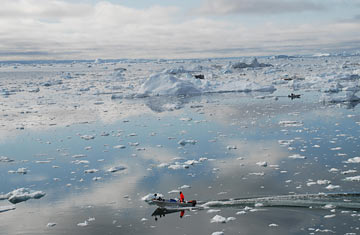
A fisherman sails on the ice fjord of Ilulissat, Greenland
As leaders from around the world descended on New York City this week for the U.N. General Assembly, traffic followed. Police closed off arteries throughout Manhattan's well-heeled East Side for security reasons, leaving taxis, delivery trucks and confused tourists stranded along Park Avenue. It's just another September in New York.
But the streets weren't the only place hit by gridlock. Negotiations over a new global climate-change treaty to replace the expiring and flawed Kyoto Protocol — meant to culminate at the U.N. climate-change summit in Copenhagen at the end of the year — have all but ground to a halt in recent months. Despite the election of U.S. President Barack Obama, who pledged to reverse eight years of climate inaction by former President George W. Bush's Administration, developed and developing nations remain gridlocked over who should be cutting carbon emissions — and who should be paying for it. Yvo de Boer, the head of the United Nations Framework Convention on Climate Change (UNFCCC), told reporters on Sept. 21 that the wording for a new agreement now being negotiated is "an absolute mess" so full of contradictions U.N. staff said it couldn't even be translated. "Climate-change policy tends to be a roller-coaster ride, but it seems to be getting rougher and rougher," he said.
For U.N. Secretary-General Ban Ki-moon, who has made climate change one of his top priorities, it was time to raise the stakes. On Sept. 22, Ban held a high-level conference on climate change at U.N. headquarters that included Obama and Chinese President Hu Jintao. With less than 70 days remaining before the Copenhagen summit begins, the message was unusually clear: There is no more time to waste. "The world's glaciers are now melting faster than human progress to protect them — and us," Ban told the assembled leaders.
When the session ended several hours later, Ban struck a more optimistic note, telling delegates at the U.N. that "momentum had shifted for a global deal in Copenhagen." But the truth is that there remains a great deal of uncertainty that needs to be cleared up between now and December. No one expected a one-day meeting in the U.N. to solve global warming. But Ban's conference did provide some clues about where global climate-change policy is heading and which countries will be taking the lead.
Obama: Managing Expectations
Obama was the first head of state to address the meeting, and even though he only spoke for a few minutes, his rhetoric was a dramatic departure from Bush's denial and dissembling. Obama stated clearly that climate change was real, and unless the world rose to action, it was potentially catastrophic. "The security and stability of each nation and all peoples — our prosperity, our health, our safety — are in jeopardy," he said. "And the time we have to reverse this tide is running out."
Yet even while Obama talked up the importance of the Copenhagen process and hyped his Administration's domestic initiatives on climate change, including new rules that would limit greenhouse-gas emissions from automobiles, many environmental groups came away from his speech underwhelmed. Obama made no mention of specific targets for U.S. emissions cuts at Copenhagen, nor did he agree to attend the summit himself — as British Prime Minister Gordon Brown has done. He spent much of his speech focusing on the need for major developing nations like China to make their own moves on climate change, which sounded a little hypocritical after years of American foot-dragging. "It was great to have a visionary speech with the right word from Obama," says Steve Howard, the CEO of the Climate Group, an international nonprofit group focused on global warming. "But with so little time left, we needed more substance."
